Increasing product sales were offset by reduced margins in Apple's second quarter of fiscal 2013, as the company reported its first year over year profit decline in a decade. Executives from the company participated in a conference call on Tuesday to discuss the results, and notes of interest follow.
Participating in Tuesday's call were Apple Chief Executive Tim Cook and Chief Financial Officer Peter Oppenheimer.
Highlights
- Cook said comparisons to 2012 are difficult, because last year was a particularly strong year, and margins are lower this year because of the iPhone 5 and iPad mini.
- Cook called the decline in Apple's stock price over the last few quarters "very frustrating to all of us," but said the company will continue focusing on making the best products it can.
- Apple is the same company that brought the world the iPhone and iPad, Cook said, and there are "a lot more surprises in the works."
- Apple plans to use its cash pile mostly for share repurchases. "We concluded that investing in Apple was the best," Cook said.
- More iPad mini units were sold in the March quarter than in the December quarter with expanded inventory. Most of the devices sold were to customers who did not previously own an iPad.
Apple's $100B reinvestment and dividend boost
Apple plans to spend $100 billion through the end of calendar 2015 on share repurchases and a dividend increase to $3.05.
Regarding the dividend, Oppenheimer said the Apple Board of Directors will reassess the amount on an annual basis.
The bulk of Apple's $100 billion efforts will go into share repurchases, which Oppenheimer said reflects Apple's confidence in its business. He also said it's the largest share repurchase in corporate history.
Apple plans to pay for these efforts with domestic cash, including existing reserves, future cash collected, and money that will be borrowed.
Apple has more than $144 billion in cash and reserves, but most of it is held overseas. Repatriating that cash would be too costly, Oppenheimer said, which is why Apple will instead borrow.
Shrinking margins
iPhone average selling prices were down sequentially about $28. This was driven primarily by mix, as the iPhone 4 proved to be a popular option.
"As you get farther from a previous product launch, there's a general lower mix than where it starts," Cook said. "All things being equal, you would expect to see that with most of our products."
Oppenheimer said Apple is willing to trade off short-term losses in profits for long-term success. He noted that when the first iPod was introduced, it was one of Apple's lowest-margin products before it and iTunes ended up accounting for the bulk of Apple's revenue — a shift that helped drive the company's interest in developing the iPhone.
Apple's iPad business
iPad sales saw a big year over year boost in the quarter, growing from 11.8 million in 2012 to 19.5 million in 2013.
The latest IDC data suggests that the tablet market shrunk 30 percent from December. Apple sequentially declined 15 percent, suggesting Apple had a pick up in market share after the holidays.
Cook highlighted the fact that Apple's iPad has 350,000 applications available, which puts it well ahead of the competition.
Apple's iPhone business
iPhone sales were 37.4 million, an increase from the 35.1 million iPhones Apple sold a year ago.
A year ago, Apple grew channel inventory in the second quarter because it was catching up with iPhone 4S demand.
The market grew by 30 percent, Apple grew less than that. "We do want to grow faster," Cook said. "We don't however, view it as the only measure of our health."
He noted that Apple has the highest customer satisfaction by far among smartphones. Apple also has the highest customer loyalty and repurchase rates, as well as strong ecosystem commerce that attracts developers.
"We've made the iPhone 4 even more affordable, which has made it more attractive to first-time buyers," Cook said, highlighting the strength of Apple in the lower-end of the premium smartphone market. "The phone for the price point that we're offering is an incredible value for people that allows them to get into the ecosystem with a really, really phenomenal product."
 AppleInsider Staff
AppleInsider Staff







-m.jpg)






 Malcolm Owen
Malcolm Owen

 Amber Neely
Amber Neely
 Christine McKee
Christine McKee


 William Gallagher
William Gallagher
 Chip Loder
Chip Loder
-m.jpg)






14 Comments
Apple is DOOMED !!!! /s
It may be naive of me to say this, but I think Cook should just say he thinks Wall Street is wrong about Apple and its future. Why should Cook be "frustrated." This is a buying opportunity for Apple. I own Apple stock and I hope Cook is buying tens of billions of dollars worth of stock at $400.
"a lot more surprises in the works." there had better be and not just incremental updates
Apple is DOOMED !!!! /s
/z
Apple is frustrated because its executives, and even employees, have lost a tremendous amount of wealth while negatively impacts morale. It also tarnishes Apple's reputation to where the conversation has moved from how awesome Apple's devices are to people stating the many reasons why Apple sucks - which in the end impacts sales and product opinion.